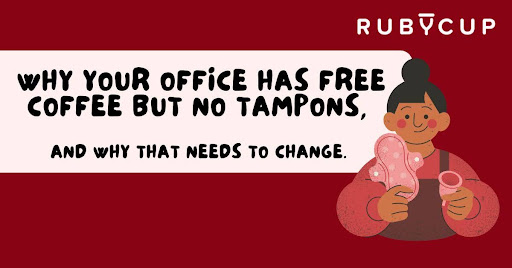Have you ever noticed your office has free coffee but no tampons or period products? It feels weird, right? Most workplaces proudly offer high-end espresso machines, yet basic menstrual care is missing. That disconnect tells people menstruating: your needs aren’t a priority. And that needs to change, fast.
Menstrual health in the workplace isn’t a “nice-to-have” – it’s a necessity.
Why Offices Prioritize Free Coffee But Overlook Period Care
Offices love free coffee because beans and filters cost pennies per cup, spark quick energy boosts, and feel like an easy “nice perk.” Leaders see coffee stations as low-risk morale boosters.
But when it comes to period care, suddenly it feels “too personal” or “too expensive.” In reality, providing free period products, like tampons, pads, or menstrual cups, costs about the same as coffee, especially over time. It takes a real shift in corporate social responsibility (CSR) to view menstrual products as basic hygiene, not an extra.
What the Data Says: From the UK to the World
In the UK alone, 14.4 million people in the workforce menstruate. Yet:
- 7 % feel discriminated against due to menstrual symptoms.
- 8 % have thought about quitting their jobs because of lack of support.
- 31 % resort to makeshift solutions like toilet paper or fabric.
Only 12 % of the UK’s 5.6 million businesses have a menstrual care policy, meaning 88 % still fail to support basic needs.
Globally, more than 300 million people menstruate each day, and an estimated 500 million lack access to adequate menstrual products and facilities World Bank PMC. These numbers show that while free coffee is nearly universal, menstrual equity at work remains rare, worldwide.
How Offering Tampons, Pads, and Cups Boosts Employee Wellness
When you swap “free coffee but no tampons” for a true wellness perk that includes period products, you do more than prevent awkward emergencies. You tell your team: we see you, we value your comfort, and we want you at your best.
- Reduced Absenteeism: A 2023 Harvard Business Review analysis found workplaces with menstrual support saw a 10 % drop in sick days.
- Higher Retention: Staff who feel cared for are 21 % more likely to stay past one year.
- Better Morale: Simple acts, like stocking medical-grade silicone menstrual cups, build trust and belonging.
Through the Ruby Cup CSR program, companies can offer reusable menstrual cups, saving employees money and slashing plastic waste, all while boosting well-being.
Adding a Global Policy Perspective: What Governments Are Doing
Some governments are already stepping up:
- Scotland’s Period Products (Free Provision) Act 2021 makes it a legal duty for local authorities to provide free menstrual products in all public buildings, including workplaces run by public sector bodies, since August 2022 Wikipedia.
- Northern Ireland passed similar legislation in 2022, ensuring free supplies in schools and public facilities.
While your company may not be legally bound (yet), these laws set a strong precedent and illustrate the shift toward recognizing period care as a basic right.
Tackling Deeper Resistance: Understanding Stigma and Bias
Why do managers push back? Beyond cost or logistics, many feel squeamish discussing periods. That discomfort often stems from:
- Historical Taboos: Centuries of treating menstruation as shameful.
- Unconscious Bias: Assuming only cisgender women menstruate.
- Lack of Awareness: Underestimating how often people need products at work.
Breaking down stigma takes more than adding products to a restroom. It means honest conversations and leadership endorsement. When executives normalize period talk, just like they talk about coffee, they dismantle bias.
Strengthening Inclusivity: Beyond “Women’s Restrooms”
Menstruation isn’t limited to cisgender women. Transgender men and non-binary people may also need products. To be truly inclusive:
- Stock supplies in all-gender restrooms.
- Offer a range of products (tampons, pads, cups).
- Use gender-neutral signage when possible.
This approach ensures every menstruator at your company feels seen and supported.
Broader Menstrual Health Support: More Than Just Products
Providing products is crucial, but comprehensive menstrual care can also include:
- Flexible Work Policies: Allowing remote work or break flexibility during painful days.
- Education and Training: Hosting workshops on conditions like endometriosis or PCOS.
- Open Communication: Ensuring staff feel comfortable discussing menstrual needs without penalty.
These policies show you’re invested in long-term well-being, not just a one-off perk.
Real Voices: An Employee’s Perspective
“Imagine you’re about to pitch in a big meeting when you realize you have no tampon. The panic, the scramble to find something, maybe toilet paper, then the fear of staining your clothes. That anxiety is real every month for millions at work.”
Giving period products isn’t just practical, it’s a simple way to reduce everyday stress.
Cost Comparison: Coffee vs. Cups
- Coffee: An average office might spend $100 per employee per year on beans and supplies.
- Period Products: A Ruby Cup costs about $25 once and lasts up to 10 years—that’s under $1 per employee per month over a decade.
When you see it side by side, the math is clear: investing in menstrual cups is a budget-friendly, sustainable choice.
Step-by-Step: How to Roll Out a Menstrual Care Policy
- Survey Your Team
- Ask which products they prefer whether it’s menstrual cups, period underwear, or single-use solutions.
- Partner with a Vendor
- Choose a provider like Ruby Cup that handles supply, shipment, and donation for period-poverty programs.
- Educate Your Staff
- Host short lunch-and-learn sessions defining terms like “menstrual equity” and how to use cups.
- Track & Report
- Monitor usage, collect feedback, and share results in your next CSR report.
By following these steps, such as initiating your team survey this week, you weave menstrual care into your wellness strategy as seamlessly as your coffee lineup.
Conclusion
Your office’s “free coffee but no tampons” stance highlights a simple truth: menstrual health often gets left out of workplace benefits. By offering menstrual cups or period underwear to your employees, you boost wellness, cut waste, and advance your CSR goals, all for under $1 per person per month over ten years.
Action Steps:
- Survey employees on period-product needs this week.
- Partner with a reusable menstrual-care provider like Ruby Cup.
- Normalize conversations in staff meetings.
- Share your impact in the next CSR update.



























